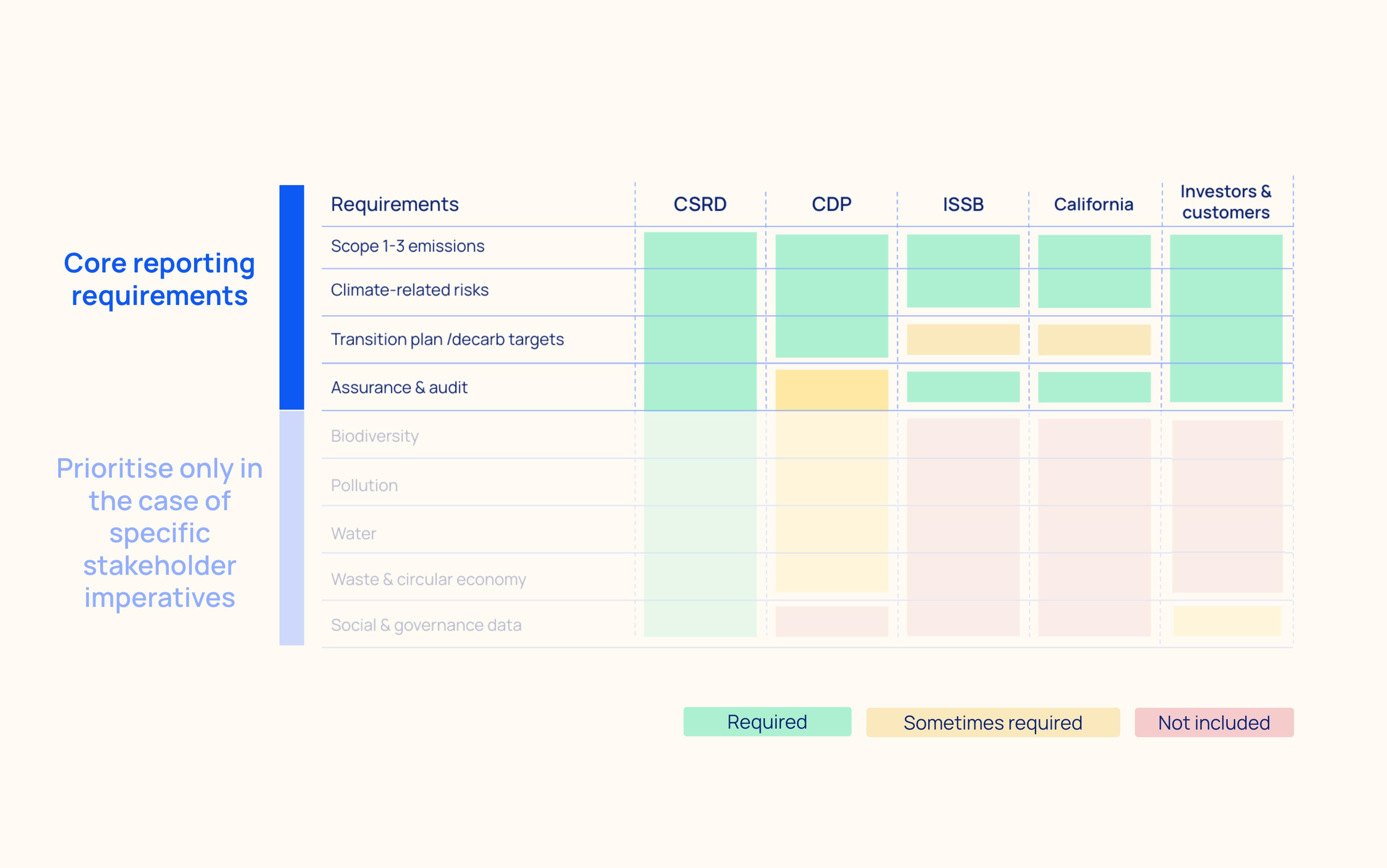
Just over a month ago, the European Commission unveiled its Omnibus proposal to streamline a collection of EU Green Deal regulations including the CSRD. While the proposal is aimed at reducing some of the burden on companies readying to report, it has created interim uncertainty for companies preparing for these regulations. In a recent post-Omnibus briefing we held, sustainability leaders asked more than a hundred questions seeking clarity on what these changes might mean for priorities, timelines, teams, and budgets and how to best determine next steps. For companies unsure of what to do next, we recommend using this period to sharpen your focus on a set of core requirements that have emerged as universal and will best position you to keep momentum in a time of change.
Determine your sustainability imperatives
Many companies have been fully consumed by CSRD due to its expansive scope, forcing them to deprioritize core sustainability work. For companies facing a potential delay, this could become a crucial opportunity to refocus and redefine what constitutes your company’s sustainability imperatives. Start by evaluating your regulatory exposure, investor and customer expectations, and internal sustainability goals to determine what truly matters for your business. For a UK company, this may mean prioritising FCA-mandated TCFD compliance, assurance-grade data for investors and customers, and publishing annual sustainability/ESG reports with clear climate targets and progress. For a US company, the focus may shift to upcoming California regulations, ISSB preparation, and voluntary CDP reporting.
Focus on common reporting requirements
Despite proposed shifts in regulatory frameworks, a set of common metrics has emerged that are consistent and expected across mandatory and voluntary reporting requirements. Rather than reacting to each framework individually, organizations should focus on these foundational elements that appear across the CSRD, CDP, ISSB, and California's CCDAA.

The highest-priority common elements include:
- Scope 1-3 emissions measurement and reporting
- Climate-related risk management
- Transition planning / decarbonization targets
- Assurance and audit processes
Companies that take this cross-framework approach will build a strong foundation that supports multiple disclosure requirements without starting from scratch each time regulations change.
Build a data infrastructure to power both reporting and action
For the past few years, corporate sustainability has been dominated by a report-specific mindset. Many companies initially built their environmental programs reactively—starting with individual framework requirements and working backward to data collection. The result? A fragmented landscape of disconnected spreadsheets, manual processes, and data systems that are difficult to manage, prone to errors, and unable to scale with evolving regulations. As reporting requirements expanded, sustainability and finance teams found themselves spending countless hours reformatting the same data for different questionnaires.
Companies cannot build a scalable corporate sustainability strategy on spreadsheets or last-mile reporting tools. This potential adjustment period offers a window to overhaul your approach and build better, more flexible sustainability data platforms. Reporting should be one output of these platforms, but they should also power the operational decisions companies make each and every day.
Shift into action
If your reporting timelines have changed, use this time to make the progress that will show up in those first reports. Get into a practice of voluntary disclosures through CDP and customer or investor reports. Integrate sustainability reporting into your executive reporting sessions, define data standards, set targets and develop strategic plans for making progress against them. Prepare now so you won’t have to incur the cost of last-minute action a year from now.
Companies that prioritize action during this period will not only be better prepared for upcoming reporting requirements but will also produce disclosures that demonstrate real progress—making their reports more meaningful and valuable to stakeholders.
Looking ahead
The Omnibus proposal offers a pivot point for corporate sustainability. Companies can either continue patching together last-mile reporting solutions for each new framework, or they can build data foundations that turn environmental measurement into a source of competitive advantage.
The future of corporate sustainability isn't about having the right answers for today's frameworks—it's about building data infrastructure that can answer any question tomorrow might bring. Companies that take a proactive approach—focusing on common core disclosures, aligning with stakeholder expectations, and investing in strong data systems—will be better positioned to navigate future requirements with confidence.
This is a moment to take stock, build resilience, and ensure sustainability programs are ready for the road ahead.












